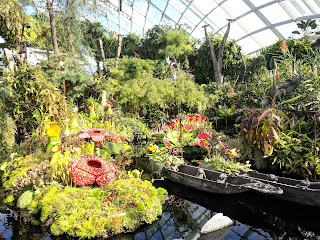Regardless of whether you’ve been gardening for ages or are a novice when it comes to this hobby, you’re surely always on the lookout for hacks that can make you a better gardener. Additionally, you certainly know how important water can be for the health of your plants. However, seeing as how four billion people across the globe experience severe water scarcity, conserving water should also be high among your priorities when taking care of your garden. If you’re not sure how to save water, keep these six tips in mind.
Save water from your household and collect rainwater
For starters, it’s best if you can collect water around the house instead of using tap water or buying bottled water to water your garden. Start by recycling water that you use inside your home. For example, you can collect the water you used to boil pasta, vegetables, and other foods. Anything that is left behind in glasses, pitchers, and bottles should also be put into a larger container that you will use for watering your crops. Furthermore, water from the bathroom that isn’t used, such as the cold water that you let go down the drain, can also be preserved for when your plants are thirsty. Finally, besides collecting water around the house, you can also collect rainwater. There are various systems that you can use to harvest water so look into the solution that will work best for you.
Grow plants that don’t need a lot of water
In addition to collecting water from various sources, you should also conserve water by learning more about the plants you intend on growing. While it’s always a good idea to do research before you plant anything, you especially want to pay attention to how much water a plant requires. Although you might want a big variety of veggies, fruits, and herbs, opting for those that won’t need huge amounts of water can be both good for your wallet and the environment. For instance, lime and pole beans, field peas, cowpeas, and black-eyed peas as well as corn, summer squashes, and most herbs are all drought-tolerant and thrive in hot climates. Moreover, planting crops closer together means that they will require less water.
Know when to water the plants
Something else that is vital when trying to save water is knowing when to water your plants. Research shows that crops that are planted in the ground do best when they are watered in the morning while those in pots should be watered in the afternoon. This depends on the soil the plants are in as traditional soil and potting mixes have different properties in terms of moisture retention. What is more, the soil type also plays a role. For example, clay-based soils require more water but less frequent watering. Lastly, watering at the wrong time can also result in more evaporation.
Get the right equipment
To save water, it’s also essential to have the right equipment. For starters, a moisture meter is a great tool that will tell you exactly when you need to water. Then, a quality hose and retractable hose reel that will let you control exactly how much water you’re using will also be helpful. Other tools that will come in handy are timers that allow you to schedule watering your plants even when you’re not home as well as watering cans that will let you measure how much water you are using.
Use mulch to lock in moisture
You always want to prevent evaporation, which is why applying mulch in the spring is imperative. Doing this will ensure the moisture is locked in. That way, you will not have to water as frequently and you’ll be able to save water. As mulch comes in different forms, you can even get some organic alternatives that will get absorbed by the soil over time and feed your plants as well.
Don’t overwater your plants
Last but not least, you must ensure you are not overwatering your plants. This bad habit will not only increase your bills but it can also lead to root rot and result in your crops dying. So, even if you find yourself watering once the sun sets, use solar garden lights in order to see how much water you’re using and how wet the soil is getting.
Water is a precious resource and we should do our best to not waste it. Keep these six tips in mind to conserve water in your garden.









